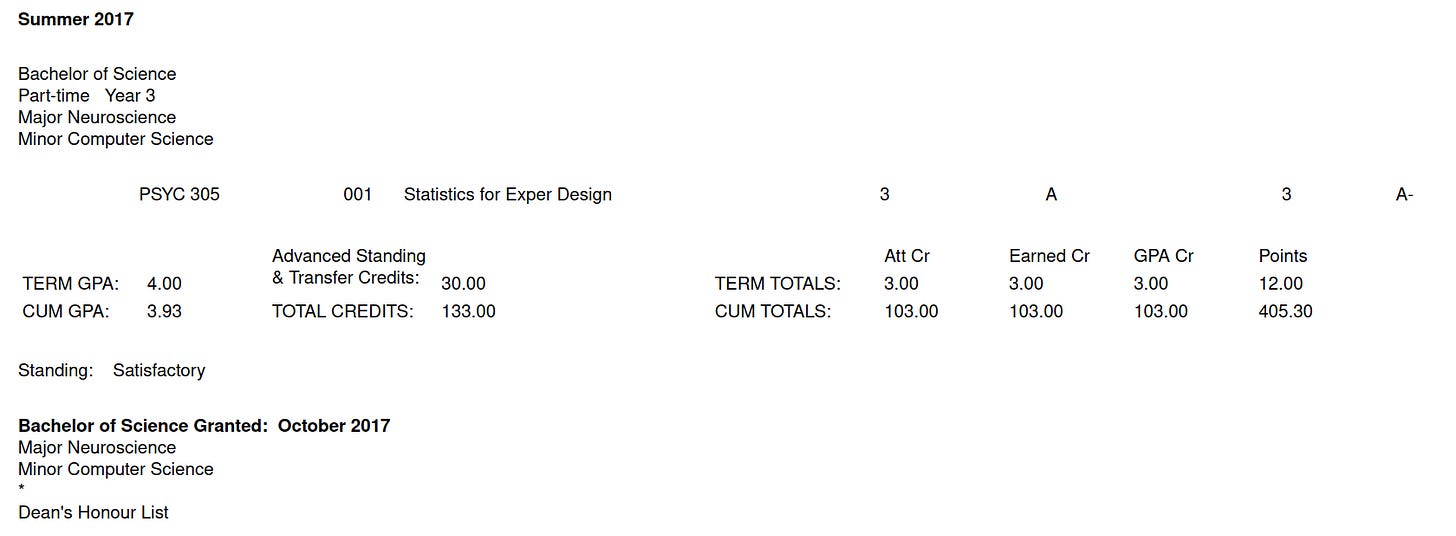get your A in college and stop wasting your life
it's not complicated.
the school year is soon starting back and I got reminded by a master student in germany how brutal it is for some.
so this sem, I doubled down, stopped all outdoor activities, spent every hour in learning the subjects and practicing math to the point I got saturated staying in my room (subject is Signal Processing) and I still got failed (I panicked in the exam of concepts I was familiar with and forgot them totally).
This is really bothering me as I thought I will get done with subjects and start writing papers as I want to become a Research Engineer.
my heart goes out to these poor students for whom failing a class is a likely stressor throughout the year.
I tutored all throughout my undergrad and grad time and I’ve seen firsthand how it can turn people into molten stress balls.
so here’s my simple mindshift steps to make sure there is 0% chance you will fail a class ever again.
disclaimer:
please don’t turn into an asshole
always anchor your action in fairness
this is mostly applicable to adversarial grading setup doesn’t work for research or practical projects.
step 1: burn your current grades mindset down
let’s get one thing straight; you are currently paying for this education (you and your dads and moms).
hard earned money.
not only that but with actual time your non-refundable life essence.
the way you are likely conceptualizing this transaction is the following:
you pay the school money and time
in exchange there is a teacher who will teach you about the subject
if you do a good job at learning the topics the teacher will award you points
if you get enough points you pass the class and can move on to other class
you can even get enough points to get these golden A grades that are such a pride for you and your genetic dynasty
my sweet summer child, what is this.
this isn’t 1943, this isn’t how any of this work.
you take all of these nice ideas and bury them deep deep deep.
step 2: flip this mindset up
it’s the year 2025 of our lord jesus guys.
everything is available online to an extent that the only gap between you understanding something is your drive to learn the topic.
you aren’t paying to learn.
you are paying to have a stamp of approval from a university that you have a validated baseline understanding of a set of topics.
the way they can give you that stamp without dilluting the value of the stamp is to grade you *objectively.
you are giving money and time to get the stamp, not to get the learning.
the deal is actually the following:
you pay the stamp provider money and time.
in exchange they assign a whole roster of teachers to GATE access to that final stamp.
if you do a good job at following the teacher's expectation they will remove less points in the class.
if you have enough points left at the end of the class you can move on to the next gate.
if you do a very good defensive job you can even get these A-grade which give you access to even better stamps!
*now now I know what you are thinking.
what is this bastardization of the learning institution? where are these golden value of learning and curiosity that should be instilled into every puppil heart?
hold that thought because it’s going to get worse.
step 3: you start with an A grade and your job is to defend that grade
with this mindset in your noodle basket next thing you need to understand is that every class start with an A grade.
your only job throughout the semester is to guard this grade from the teachers that have the mandate from the power-that-be to chip away at your beautiful and perfect grade.
now, they are only doing their job and 99% of teacher are doing it fairly.
they will tell you flat out how they are going to remove you points, like in excruciating details.
any modifier like curving down or up they usually also mention it during the very first classes.
you can even drop out of the class in most uni without any penalty during the first few weeks if you don’t like the deal.
this chipping away at your sweet beautiful grade is anchored in fairness.
it’s your job to understand how the chipping is done.
step 4: plan your defense
this process usually starts way before the semester start during the selection of the class.
you got options and agency here.
you can decide if this semester will be a confusing mess or an uphill negotiation battle or a topic focused season or an embarassingly dumb-easy ones.
it’s your life guys.
there’s many permutations you can do but overall here’s what principles I think you should adopt:
avoid at all cost courses that are thought by a difficult teacher. if you like the topic they teach, well nice just self-learn it.
select courses that make sense for your stamp (aka avoid courses on lunar cycles just because they are easy).
try to pick topics that overlap in main subjects to get some transfer learning happening during the study sessions.
if you can’t avoid a difficult teacher, make sure to spread them out so that you don’t get a whole semester in hell.
don’t forget that all of the above is subjective.
some people click better with a teacher than others or maybe you really fucking love lunar cycles.
just make sure you feel comfortable with your choices here.
step 5: understand how the points are removed
understand this for each of these beautiful hand-picked organically sourced classes you took ownership of going through.
it’s absurdly simple to figure this part out:
read that syllabus and study it.
figure out when points are up for deduction and to which proportion.
figure out for each point deduction events (i.e. assignment, midterm, take-home, finals, bonus exercise, quizz, attendance, lab) how they are deducted. sometimes you can’t have all the details too early.
whenever applicable try to get examplar of these points deduction event (legally) like an old exam, prior assignment with correction or quizzes.
whenever in doubt you go knock on these teacher doors and you flat out ask them.
I can’t emphasize enough how important this is folks.
you don’t have to yolo this.
it’s not a mystery how points are removed from your grade; there is a direct reasoning trace behind the grading scheme.
just get this information and document it for each one of your class.
step 6: fortify your fortification
you study for an assignment or an exam to not have your previous points deducted.
repeat this every time you open these pricey books.
this means a few things:
the bulk of your study session should be aimed directly at defending your points. don’t go on to read a random chapter for the sake of it. is this in the grading scheme in any sort of way??? NO??? WHY YOU DO THIS THEN!
sorry, but it needs to be emphasized folks, your time is short before the grading chipping start and the stress start growing so make sure that all your study actions are aligned with the point removal ritual.
whenever you don’t know if something is going to be on the exam, just ask man. worst case you are mildly annoying and they are going to say ‘maybe’. you take that as a yes and you move on.
move most of your learning to exercises that tightly mirror how you are getting graded.
multichoice knowledge exam? → flash card
open-ended question? → outcome-based project learning
short objective question? → drill all the exercises multiple times.
if there is a topic that resonate with your toddler soul with a vibrant note use it to decompress. but make a clear separation between that type of learning and the stamp type.
btw as soon as you know that your A is defended 100%, move on to the less defended class.
there’s no point in reinforcing the murud-janjira with taller brick walls.
step 7: keep your eye on fairness
now come the touchy subject which can be culturally very difficult to understand for some.
here we go:
your teacher is an human being and can make mistake.
oh boy, yes and it happens much more than you think.
the situation can get very very very sticky very fast if you don’t have your eye on fairness.
which means that for every point that is deducted it is your god given imperative to understand why.
this is one of the few spots in life where you are literally owed an explanation.
AND BY THE GREAT MONAD UP ABOVE YOU ARE GOING TO GET IT.
this is the portion of the article where I will emphasize two conflicting things:
you got to stand up for yourself
don’t be an asshole
since the situation can get emotional and very adversarial fast just try your best ok.
here’s some guidance:
when you get your corrected assignment/exam look at each of your deductions.
try to understand why you got points deducted.
if you do understand don’t snivel take the loss and fortify your defense.
if you do not understand you go see whoever corrected it for an explanation.
if the explanation has a logical flaw you will need to give your argument as to why that is and get your points back.
public forum are great for this if you have a knack for insightful and polite argumentative writing, but it is more emotionally charged for the teacher.
whenever a TAs commited a mistake and doesn’t want to budge, you NEED to escalate to the teacher and get to the bottom of it. doesn’t matter if it’s just 2 points these are yours.
this is the hardest realization for a polite and shy student.
you sometime have to stand the hell up and point to a situation which is unfair and sometime it’s not a fun discussion to have.
some ways to alleviate these tricky situations are the following:
whenever you find a potentially ambiguous question in an exam, even if it’s multiple-choice, always write why you think the question is ambiguous and detail your thought process for the ambiguity.
network with your peers to ensure that the fairness was evenly applied and to garner some group power modifier when dealing with a very difficult teacher with a penchant for unfairness.
build a relationship with the teacher by not only showing up for your points but also for your questions. they know they can’t just shoo you away because guess who’s coming back next week for office hour?
this pay-back crusade in the holy name of fairness is an integral part of the university experience.
final step: make use of your reclaimed time for real learning
now that you stopped wasting your time on bumbling around for your grade you can invest these newfound hours into something that has a high learning potential like:
get invovled in labs: you most likely have access to labs in your uni go volunteer in there to witness the limit of human knowledge.
get an internship: the stamp is for getting a job, try to secure that job beforehand my guy.
sign up in a student club: you will be able to network with driven folks, work on cool cv worthy projects and get proximity with the industry.
build your own cool projects: you have access to much more than just gates and stamps in uni. make use of the facility and all your perks in there to make something you are proud of.
anyway hope this useful folks have a fantastic 2025-2026 school year!




